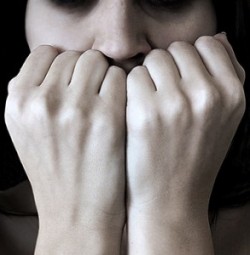Generalized Anxiety Disorder Symptoms
Generalized anxiety disorder (GAD) is more intense than the average anxiety experienced regularly by most people. Suffering from GAD means constantly feeling like you’re living on the edge of disaster, with no escape from endless worry about money, work, family and relationships. This tension and worry is chronic and unprovoked. In many cases, the source of distress is very difficult to pin down.
The most common anxiety disorder symptom is worry that continues for at least six months, even when there is no obvious reason. The mind constantly bounces from one worry to the next. The sufferer may be perfectly aware that the level of anxiety far outweighs the actual risk or scope of the problem, but is still incapable of controlling the feeling of impending doom.
The inability to relax and frequent sleep disturbances are also common anxiety disorder symptoms. Many GAD sufferers tend to startle easier than other people, fatigue more easily and have a hard time concentrating. In some cases, depression or substance abuse develops along with generalized anxiety disorder.

Generalized anxiety disorder symptoms can be intense and leave you feeling overwhelmed.
Anxiety disorder symptoms present physically as well. Tell-tale signs such as twitching, muscle tension, headaches, trembling, sweating and irritability are a few of the outward signs of anxiety. A person may feel out of breath or light-headed, or suffer from nausea. Sometimes they may feel as if they have a lump in their throat.
When anxiety disorder symptoms are mild, people with GAD can function normally in social situations and successfully hold down a job. If a person is suffering from a severe case of GAD, the disorder can be very debilitating, making even the most routine daily tasks difficult to accomplish.
Symptoms Specific to Generalized Anxiety Disorder
The following are some symptoms that are specific to general anxiety disorder.
- The person has experienced excessive worry over several different issues that has lasted for at least six months.
- The person finds it impossible to control the worry.
At least three of the following symptoms are associated with the anxiety for the past six months:
- Feeling keyed up or “wound”
- Becoming easily fatigued
- Extreme irritability
- Tense muscles
- Difficult time getting to or staying asleep
Furthermore, it must be made clear the anxiety experienced is not due to any other reason, such as stress over having a panic attack, being humiliated in a public situation(social phobia), being away from home or close family(separation anxiety) or any other possible disorder.
With more serious cases of GAD, the anxiety disorder symptoms, both mental and physical, cause significant and sometimes debilitating impairment to the sufferer’s ability to function.
In addition, it must be determined that the disorder is not the result of substance abuse or an undiagnosed medical condition. It should be established that the anxiety disorder symptoms do not occur only during a psychotic break or a mood disorder.
Generalized anxiety disorders affect 6.8 million adults in the United States. It strikes twice as many women as men, and can occur at any point in the life cycle. If you think you may be struggling with this disorder, talk to your healthcare provider right away. The earlier GAD is treated, the more successful the outcome.
http://www.nimh.nih.gov/health/topics/generalized-anxiety-disorder-gad/index.shtml
http://umm.edu/health/medical/ency/articles/generalized-anxiety-disorder
http://psychcentral.com/disorders/generalized-anxiety-disorder-symptoms/





